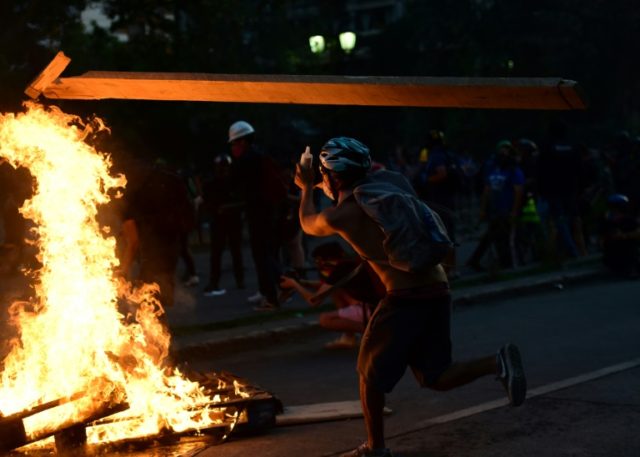Santiago (AFP) – Protests against social inequality have rocked Chile for nearly a month, in an explosion of violence that has claimed more than 20 lives.
Here is a recap of key developments in the country’s worst crisis since its return to democracy in 1990.
– Metro tickets trigger –
On October 18, violence breaks out at protests in Santiago against a rise in metro fares, escalating into clashes between demonstrators and riot police.
More than 40 of the city’s metro stations are destroyed. Buses and buildings are torched.
Around midnight, President Sebastian Pinera declares a state of emergency.
On October 19, soldiers are deployed into Santiago as thousands join the protests by banging pots and pans in the street.
Anti-government demonstrations spread to other cities, incorporating a range of grievances including low wages and high costs for education and healthcare.
Hooded demonstrators clash with riot police and soldiers near the presidential palace. More buildings are torched.
Pinera suspends the ticket price hike. An overnight curfew is imposed on Santiago.
– Death toll mounts –
Clashes, looting and vandalism continue on October 20, when two women burn to death at a ransacked supermarket.
Police and soldiers use tear gas and water cannons against protesters in the capital. The state of emergency is extended to nine other regions.
On October 21, authorities report that 11 people have been killed in the eruption of violence.
Pinera announces social relief measures on October 22, including increasing the basic pension and freezing utility rate hikes.
A two-day general strike begins the following day.
– Calls for Pinera to quit –
On October 25, more than a million people demonstrate around the country to demand Pinera’s resignation as well as economic reform.
As tensions ease, the nighttime curfew is ended on October 26. A day later, the state of emergency is lifted.
On October 28, Pinera reshuffles a third of his cabinet. But the street movement continues, with clashes in Santiago, Concepcion and Valparaiso.
On the 29th, workers at the world’s biggest copper mine launch a 24-hour strike.
The government on October 30 pulls out of hosting two major international events due in November and December.
Officials meet with leftist opposition leaders on October 31. On the table is a demand for an overhaul of the dictator-era constitution, which does not establish state responsibility to provide education and healthcare.
– Looting and vandalism –
On November 4, clashes break out as tens of thousands of people gather in Santiago, where barricades are erected for the first time.
Looting and vandalism are reported in Vina del Mar, Valparaiso and Concepcion.
The South American football authority CONMEBOL switches the venue for the November 23 Copa Libertadores final from Santiago to Lima.
Pinera tells the BBC on November 5 that he will not resign. Two days later he tightens public order laws.
– Referendum relief –
Pressure builds on November 12 as the peso drops to record lows and there are clashes close to the presidential palace.
Around 80,000 people march in Santiago as 100 organizations call a new strike.
In a breakthrough on November 15, after hours of intense negotiations, lawmakers agree to the key opposition demand for a referendum on replacing the constitution.
The plebiscite is planned for April 2020.

COMMENTS
Please let us know if you're having issues with commenting.